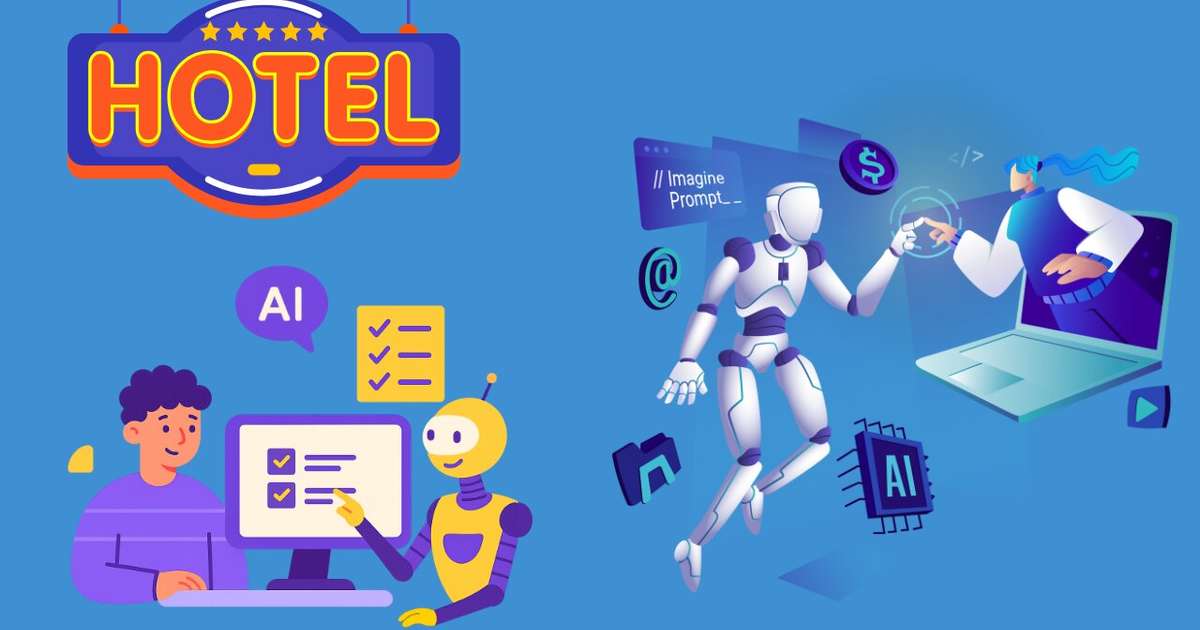
The hospitality industry has always been about people, connecting with guests, anticipating their needs, and delivering memorable experiences. But what happens when the hospitality sector embraces a new kind of partnership: one where Artificial Intelligence (AI) and humans collaborate to amplify these experiences? What if AI could empower hoteliers, streamline operations, and enhance guest interactions in a way that was never possible before?
This is not a far-off dream; it’s happening right now. The fusion of AI and human expertise is setting the stage for the future of hospitality. AI isn’t here to replace the human touch—it’s here to elevate it, creating a seamless integration where both can thrive together. But how can the hotel industry learn to embrace and harness this collaboration to its fullest potential?
In this article, we’ll explore how AI and humans can learn to collaborate in the hotel industry, driving a revolution in guest experiences, operational efficiency, and employee satisfaction. By focusing on education and practical strategies, we can build an environment where AI amplifies human strengths and vice versa.
1. The Rise of AI in Hospitality: Not a Replacement, But a Partner
AI is already making significant strides in the hospitality industry. From chatbots that handle basic guest inquiries to algorithms that predict booking patterns, AI is transforming how hotels operate. However, the true value of AI lies not in replacing humans but in partnering with them to create a more efficient, personalized, and seamless experience for both guests and staff.
For hoteliers, this means learning to use AI as an augmentation tool. AI can automate repetitive tasks, analyze data at scale, and offer insights that humans alone could never uncover. At the same time, AI can free up staff members to focus on the tasks that require human empathy, intuition, and creativity, like building authentic relationships with guests, handling complex situations, and creating unforgettable experiences.
By reframing AI as a collaborator rather than a competitor, hotels can unlock a future where technology and human expertise work together to deliver superior service.
2. Educating Hotel Staff: Bridging the AI Knowledge Gap
For AI to truly take root in the hotel industry, hotel staff must be equipped with the skills and knowledge to understand and use AI tools effectively. This is where education becomes crucial.
Most hotel workers are not tech experts. They may understand customer service, operations, and guest relations inside and out, but AI and technology can feel intimidating or foreign. This is where proper training and support systems come into play. AI tools shouldn’t be just another “tech thing” in the back office; they should be integrated into the workflow in a way that feels intuitive and empowering.
Education programs can play a key role in helping employees see the value in AI and how it can enhance their daily tasks. For example, front desk staff can be trained to use AI-powered chatbots to handle basic guest inquiries, allowing them to focus on providing personalized, human interactions that require emotional intelligence. Housekeeping staff can benefit from AI-powered scheduling systems that optimize their routes and minimize downtime, leaving them more time to focus on maintaining a pristine and welcoming environment for guests.
The key to successful AI adoption in hotels is providing the right kind of training—one that empowers employees to see AI as a tool that makes their jobs easier, not harder. By investing in this education, hotels can build a workforce that is both technologically savvy and emotionally intelligent.
3. Human-AI Collaboration: How AI Enhances the Guest Experience
One of the most exciting aspects of AI in hospitality is its potential to enhance the guest experience. Imagine a world where every guest interaction is personalized, efficient, and seamless, without sacrificing human connection.
AI can analyze vast amounts of data, such as booking history, preferences, and behavior patterns, to provide insights into guest needs and desires. With this information, hotel staff can offer tailored experiences, such as suggesting activities, amenities, or room upgrades based on the guest’s past choices. But AI doesn’t just suggest these things; it also empowers hotel staff to make real-time decisions that delight the guest.
Take, for example, a hotel concierge using AI to offer personalized recommendations. AI can sift through a guest’s history, preferences, and real-time information like weather patterns or local events to suggest tailored activities or dining options. But it’s the concierge’s expertise, emotional intelligence, and creativity that truly bring those suggestions to life, perhaps suggesting a hidden gem that AI might not know about or adding a personal touch that makes the recommendation feel special.
The result? A guest experience that feels both personalized and deeply human, with AI providing insights and recommendations that allow hotel staff to shine.
4. Operational Efficiency: AI as a Silent Partner in Streamlining Hotel Operations
While guest experience is crucial, operational efficiency is just as important. In a world where margins are thin and competition is fierce, hotels need to run like well-oiled machines. This is where AI can make an impact by automating processes and optimizing operations.
AI can help hotels predict demand, optimize pricing, and allocate resources more effectively. For instance, dynamic pricing algorithms can adjust room rates based on factors like demand, competitor pricing, and even weather forecasts. AI can also automate routine tasks such as checking guests in and out, managing housekeeping schedules, or tracking inventory.
For hotel managers and staff, this means less time spent on administrative tasks and more time focusing on what matters most: the guest. AI can take care of the “busy work” that often bogs down hotel staff, allowing them to focus on higher-value activities, such as providing exceptional service or brainstorming new ways to surprise and delight guests.
5. The Emotional Intelligence of Humans: Why It Still Matters
Despite all the advancements in AI, one thing remains clear: humans still have an essential role to play in the hospitality industry. AI can provide efficiency, data analysis, and even personalization, but it can’t replace the emotional intelligence that makes human interactions so powerful.
It’s the warmth in a hotel staff member’s voice, the empathy when a guest is having a rough day, and the genuine smile that makes a guest feel welcome. These are the moments that AI can’t replicate. And this is where collaboration between AI and humans becomes critical.
While AI can optimize tasks and provide data-driven insights, it’s the humans who turn these insights into real-world magic. Think of it as a dance: AI provides the rhythm and structure, and humans add the soul, creativity, and emotional connection that make every guest interaction memorable.
Hotels that embrace this collaboration will not only enhance their guest experience but also empower their employees to excel in their roles. By leveraging the strengths of both AI and human intelligence, hotels can create an environment that is both efficient and emotionally resonant.
6. Overcoming Resistance: How Hotels Can Cultivate a Culture of AI Collaboration
One of the biggest hurdles to widespread AI adoption in hotels is resistance to change. Many hotel employees may be skeptical of AI, fearing it will replace their jobs or make their roles more difficult. Overcoming this resistance is key to creating a successful human-AI collaboration.
Hotels need to create a culture that celebrates change and innovation, where AI is seen as a partner, not a threat. This starts with leadership, hotel executives who must communicate the value of AI, show how it can improve both the guest experience and employee satisfaction, and provide training to ensure staff feel confident using these tools.
It’s also important to address concerns head-on. Employees should be encouraged to ask questions, share their concerns, and provide feedback on how AI tools are integrated into their workflows. By involving employees in the process and making them part of the AI adoption journey, hotels can foster a sense of ownership and excitement about the potential of AI.
7. The Future of AI and Human Collaboration in Hospitality
Looking ahead, the collaboration between AI and humans will only grow stronger. AI will continue to evolve, providing more powerful tools for personalization, operational efficiency, and guest satisfaction. But rather than replacing humans, these tools will empower hotel staff to offer more meaningful and tailored experiences.
As AI becomes more integrated into the hospitality industry, hotels will need to invest in ongoing training, encourage innovation, and continuously reassess how AI can enhance their operations and guest interactions. The key to success will be fostering a mindset of collaboration between humans and AI, one where both are seen as essential to creating the ultimate hotel experience.
Conclusion: Learning Together to Amplify the Hotel Experience
AI is not just the future of hospitality, it’s the present. But for AI to truly transform the industry, it must work in partnership with humans. By embracing a collaborative mindset, hotels can harness the power of AI to amplify human strengths and create an experience that is both efficient and deeply personal.
Through education, collaboration, and a shared commitment to innovation, AI and humans can work together to redefine what it means to deliver exceptional service in the hotel industry. The future of hospitality is one where AI and humans amplify each other’s abilities, creating a harmonious blend of technology and emotional intelligence that will take the guest experience to new heights.
The hotel industry is on the cusp of a revolution. By learning to collaborate with AI, we can unlock new possibilities and create an unforgettable experience for both guests and staff. This is the future of hospitality. Let’s build it together.







